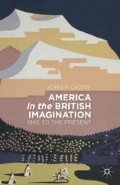Abstract
In 1943, English writer George Orwell entered a tobacconist in London and was confronted by two American soldiers “sprawling across the counter, one of them just sober enough to make unwanted love to the two young women who run the shop, the other at the stage known as ‘fighting drunk.”’ The inebriated GI immediately turned his attention to Orwell. “Wharrishay is, perfijious Albion. You heard that? Perfijious Albion. Never trust a Britisher. You can’t trust the b—s,” he loudly stated. “Can’t trust them with what?” Orwell wearily asked. “Wharrishay is, down with Britain. Down with the British. You wanna do anything about that? Then you can—well do it,” the soldier responded, sticking his chin in the air. Orwell declined the invitation and left the store in a rage. “This kind of thing is not exceptional. Even if you steer clear of Piccadilly with its seething swarms of drunks and whores, it is difficult to go anywhere in London without having the feeling that Britain is now Occupied Territory,” Orwell complained.1
Access this chapter
Tax calculation will be finalised at checkout
Purchases are for personal use only
Preview
Unable to display preview. Download preview PDF.
Notes
Paul Addison, No Turning Back: The Peacetime Revolutions of Post-War Britain (Oxford and New York: Oxford University Press, 2010);
Peter Hennessy, Having It So Good: Britain in the Fifties (London: Allen Lane, 2006);
David Kynaston Austerity Britain, 1945–51 (London, Berlin and New York: Bloomsbury, 2007);
David Kynaston, Family Britain, 1951–1957 (London, Berlin, New York: Bloomsbury, 2009);
Mark Donnelly, Sixties Britain: Culture, Society and Politics (Harlow: Pearson, 2005);
Alwyn W. Turner, Crisis? What Crisis? Britain in the 1970s (London: Aurum Press, 2008);
Andy Beckett, When the Lights Went Out: Britain in the Seventies (London: Faber and Faber, 2009);
Dominic Sandbrook, Seasons in the Sun: The Battle for Britain, 1974–1979 (London: Allen Lane, 2012);
Alwyn W. Turner, Rejoice! Rejoice! Britain in the 1980s (London: Aurum, 2010)
and Andy McSmith, No Such Thing as Society: A History of Britain in the 1980s (London: Constable, 2011).
British and European resistance to American culture is expounded by Dick Hebdige, Subculture: The Meaning of Style (London and New York: Routledge, 1979);
Rob Kroes et al. Cultural Transmissions and Receptions: American Mass Culture in Europe (Amsterdam: VU University Press, 1993)
and Rob Kroes, If You’ve Seen One, You’ve Seen the Mall: Europeans and American Mass Culture (Urbana, IL: University of Illinois Press, 1996).
On a global level, Jan Nederveen Pieterse’s, Global Mélange: Globalization and Culture (Lanham, MD: Rowman & Littlefield, 2003) and Ethnicities and Global Multiculture: Pants for an Octopus (Lanham, MD: Rowman & Littlefield, 2007) takes a similar position by emphasizing the development of hybrid cultures.
Richard Pells, Not Like Us: How Europeans Have Loved, Hated, and Transformed American Culture since World War II (New York: Basic Books, 1997), xiv and 333–334.
Adrian Horn, Juke Box Britain: Americanisation and Youth Culture 1945–60 (Manchester and New York: Manchester University Press, 2009), 1.
Victoria de Grazia, Irresistible Empire: America’s Advance through Twentieth-Century Europe (Cambridge, MA: Belknap Press of Harvard University Press, 2005), 5.
H. L. Malchow, Special Relations: The Americanization of Britain? (Stanford, CA: Stanford University Press, 2011), 5.
Andrei S. Markovits, Uncouth Nation: Why Europe Dislikes America (Princeton and Oxford: Princeton University Press, 2007), 25.
Other recent books that analyze cultural anti-Americanism include Barry Rubin and Judith Colp Rubin, Hating America: A History (Oxford and New York: Oxford University Press, 2004);
Russell A. Berman, Anti-Americanism in Europe: A Cultural Problem (Stanford, CA: Hoover Institution Press, 2004);
Jesper Gulddal, Anti-Americanism in European Literature (New York: Palgrave Macmillan, 2011);
Jean Francois Revel, Anti-Americanism (New York: Encounter Books, 2003)
and Barry A. Sanders, American Avatar: The United States in the Global Imagination (Washington DC: Potomac Books, 2011).
See also Paul Hollander, Anti-Americanism: Critiques at Home and Abroad, 1965–1990 (London and New York: Oxford University Press, 1992);
Paul Hollander, ed. Understanding Anti-Americanism: Its Origins and Impact at Home and Abroad (Chicago: Ivan R. Dee, 2004)
and Stephen Haseler, The Varieties of Anti-Americanism: Reflex and Response (Washington DC: Ethics and Public Policy Center, 1985).
Ziauddin Sardar and Merryl Wyn Davies, Why Do People Hate America? (Cambridge, UK: Icon Books, 2002);
Richard Crockatt, America Embattled: September 11, Anti-Americanism, and the Global Order (London and New York: Routledge, 2003);
Mark Hertsgaard, The Eagle’s Shadow: Why America Fascinates and Infuriates the World (New York: Farrar, Straus, and Giroux, 2002)
and Julia Sweig, Friendly Fire: Losing Friends and Making Enemies in the Anti-American Century (New York: Public Affairs, 2006).
See also Ole R. Holsti, To See Ourselves as Others See Us: How Publics Abroad View the United States After 9/11 (Ann Arbor, IL: University of Michigan Press, 2008);
Andrew Ross and Kristin Ross, eds. Anti-Americanism (New York and London: New York University Press, 2004);
Tony Judt and Denis Locorne, eds. With US or against US. Studies in Global Anti-Americanism (New York: Palgrave MacMillan, 2005)
and Andrew Kohut and Bruce Stokes, America Against the World: How We Are Different and Why We Are Disliked (New York: Times Books, 2006).
Max Paul Friedman, Rethinking Anti-Americanism: The History of an Exceptional Concept in American Foreign Relations (Cambridge, MA: Cambridge University Press, 2012) argues that the notion of a broad opposition to America and Americans is exaggerated and that the use of the concept “anti-American” only obscures valid criticisms of the role the United States plays in the world.
Giacomo Chiozza, Anti-Americanism and the American World Order (Baltimore, MD: The Johns Hopkins University Press, 2009)
and Peter J. Katzenstein and Robert O. Keohane, eds. Anti-Americanisms in World Politics (Ithaca and London: Cornell University Press, 2007) see anti-Americanism as a multifaceted belief but divide the concept into too many phenomena to be really helpful.
Copyright information
© 2013 John F. Lyons
About this chapter
Cite this chapter
Lyons, J.F. (2013). Introduction. In: America in the British Imagination. Palgrave Macmillan, New York. https://doi.org/10.1057/9781137376800_1
Download citation
DOI: https://doi.org/10.1057/9781137376800_1
Publisher Name: Palgrave Macmillan, New York
Print ISBN: 978-1-137-37679-4
Online ISBN: 978-1-137-37680-0
eBook Packages: Palgrave History CollectionHistory (R0)

